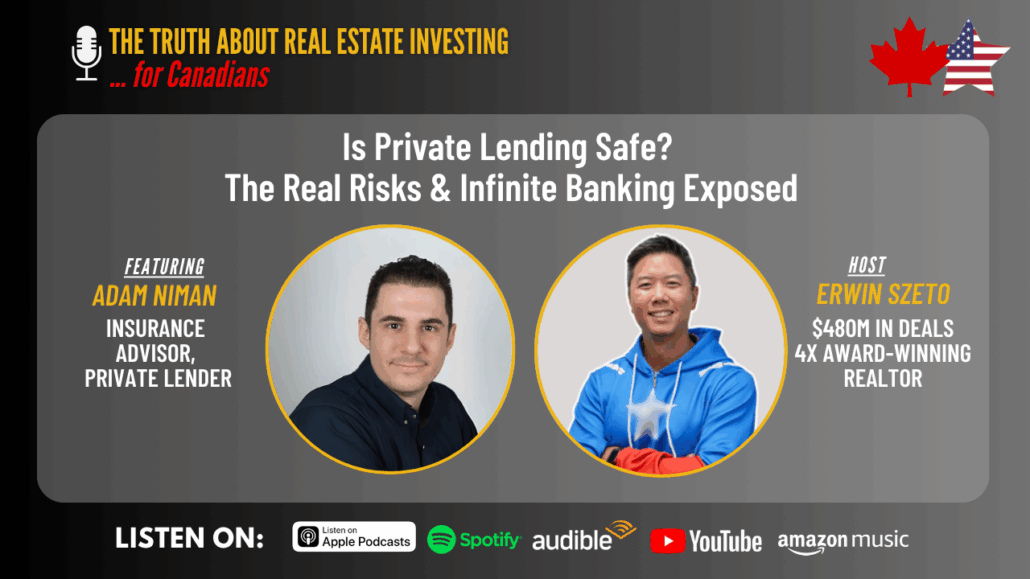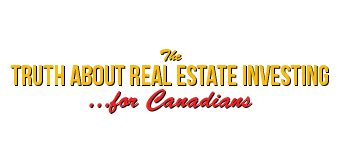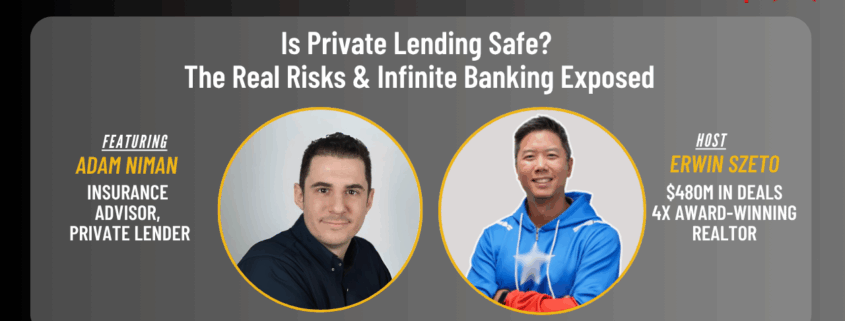Private Lending Gone Bad & Is the Infinite Banking Concept a Scam?

If You’ve Ever Wondered…
- “Is whole life insurance actually a good investment?”
- “Can I trust private lending deals that promise 10–12% returns?”
- “How do I protect my money in a risky market?”
…you’re not alone. Adam Niman asked the same questions—and after more than 15 years in financial services and real estate investing, he’s got answers that might surprise you.
In a recent episode of The Truth About Real Estate Investing for Canadians, Adam pulled back the curtain on some of the most misunderstood—and oversold—financial strategies in Canada.
THREE Lessons for Canadian Investors
1. Be Skeptical of Anything That Sounds “Too Safe”
Participating life insurance is not a magic bullet. If someone promises guaranteed growth, tax-free wealth, flexible borrowing, and high returns—pause. Ask who benefits and follow the money. Like anything, do your own due diligence.
For transparency: my wife Cherry and I own participating whole life insurance for diversification and estate planning. Several of our friends and family do too. I agree with Adam—it’s not suitable for everyone. Just like investment properties or private lending, it depends on your situation.
Cherry and I invest directly in real estate—divesting from Ontario and growing in the U.S.—to build wealth. We use whole life insurance to diversify and for estate planning. It offers flexibility, conservative returns, and—most importantly—a way to cover the tax bill when we pass, helping preserve intergenerational wealth.
2. Don’t Lend Money Unless You’re Willing to Take Over the Property
This was a massive mistake I saw friends make in small-town Saskatoon and Northern Ontario. If you wouldn’t want to operate the property, don’t lend on it. That includes crack houses, boarded-up buildings, or sketchy, low-income neighbourhoods.
Always underwrite deals assuming the worst. If you’re not prepared to carry first, second, or third mortgages, renovate, refinance, or manage the property—you’re not a true lender. You’re a hopeful speculator.
3. It’s Okay to Fail—Just Learn Fast
Anyone who says they’ve never lost money hasn’t invested enough—or is lying. I’ve lost plenty, so I’m safe to trust :). For example, I have two Hamilton tenants behind on rent. One owes $10K, I’ve paid for paralegals, and both places had costly air conditioning issues.
Adam lost money on a Fortress Syndicate deal early on. But he didn’t quit. He took responsibility, tightened his criteria, used his own lawyers, and built better systems.
To Listen:
On Spotify: https://open.spotify.com/show/6Z8yd37AQfQI5DK0J0Xwzz
Amazon Music: https://music.amazon.ca/podcasts/40fe627d-dec7-4f5d-b7e5-90a550fffe46/the-truth-about-real-estate-investing-for-canadians
Audible: https://www.audible.ca/podcast/The-Truth-About-Real-Estate-Investing-for-Canadians/B08JJS91WR
Youtube: https://youtu.be/XuOYGFHJuKw
🦸♂️Household Hero? Here’s Your Next Step
If you’re a Canadian investor trying to build wealth safely and sustainably, Adam’s journey has valuable takeaways.
It might be time to revisit your current strategies—real estate, lending, or insurance—and ask:
-
Do your investments match your long-term goals?
-
Do you fully understand how your strategies work?
-
Would a more conservative approach offer better peace of mind?
Real estate remains a powerful tool for building wealth, especially with careful underwriting and due diligence. Insurance can be useful too—but only if it supports your broader financial goals.
Need help with conservative, peace-of-mind investing—backed by Wall Street-style due diligence—plus financial planning with your best interests at heart?
Until next time, happy Canadian and USA Real Estate Investing.
Erwin Szeto,
Your Cross Border Investment Guy
Why I’m Investing in the U.S.
I’ve been investing in Ontario since 2005. It’s been a great run—starting with properties in the $100Ks, now reaching $800K–$1M. How much higher can it go? I don’t know.
The remaining appreciation potential doesn’t justify the risk. That’s why I advise clients to look to the U.S., where rental properties range from $150K–$350K USD, with rents between $1,400–$2,600/month.
These cash-flowing numbers are night and day compared to Canada. Plus, landlords have rights, there’s no rent control, and income is in U.S. dollars—which are stronger than Canadian dollars.
If you don’t believe that U.S. dollars are stronger, ask 100 non-Canadians what they’d prefer to be paid in.
To regain control of your retirement, check out the cash-flow properties at:
👉 iwin.sharesfr.com
How SHARE Makes It Easier
The best part? My U.S. investments are more passive than my Canadian ones. I work with SHARE, an asset manager that guides me through the entire process.
SHARE helps with:
- Finding quality income properties
- Structuring the legal and tax side
- Managing the property manager and insurance provider
- Saving time and money with preferred rates
They even advise on when to refinance or sell. SHARE supports investors across the U.S., which is why I plan to own in Tennessee, Georgia, and Texas. It’s like having a JV partner—without giving up ownership or control.
Final Thoughts
If increasing cash flow is your goal, I don’t know of a better strategy for most Canadians. Once more: iwin.sharesfr.com is where to see what boring, cash-flowing investing looks like on the path to financial peace.
This is how I’m making real estate investing great again—for my family and hopefully for yours too.
Sponsored by… Me!
This episode isn’t sponsored—except by my wife Cherry and me. Real estate investing is our life. It’s helped us build wealth and achieve peace of mind about retirement and our children’s future.
Interested in our systematic approach to real estate investing—the same one used by most of my podcast guests? Then check out:
📍 infinitywealth.ca/events
Till next time—just do it. I believe in you.
Erwin Szeto
W: erwinszeto.com
FB: facebook.com/erwin.szeto
IG: @erwinszeto
Disclaimer
As a committed advocate for transparent and responsible investing, I want to disclose that I am an Advisor to SHARE SFR (Single Family Rental). I hold equity in the company and earn referral commissions from clients I refer.
My endorsement of their model—focusing on positive cash flow and direct ownership—is based on personal experience and belief. Still, every investor should do their own due diligence.




Leave a Reply
Want to join the discussion?Feel free to contribute!